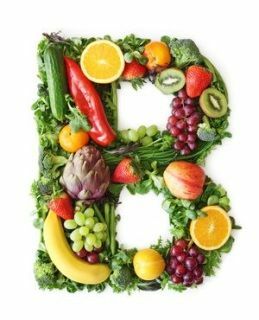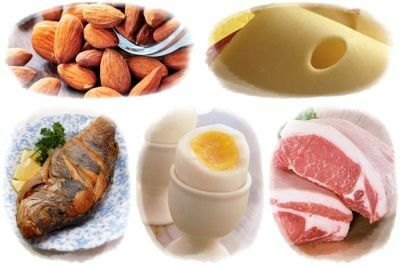Vitamins provide a person with good health and good health. One of the most necessary for the body are the B vitamins, which are daily taken from food and are not stored for future use.
Their functions are very diverse, therefore it is necessary to maintain the content of the elements of this group at the optimal level for the normal operation of all organs and systems. B vitamins in food are abundant. Daily use of them allows you to completely cover the needs of the person.
 Group B vitamins perform functions:
Group B vitamins perform functions:
- participate in tissue respiration,
- support emotional health,
- promote energy production,
- stimulate the immune system,
- participate in stress management,
- promote rapid rehabilitation after surgery and trauma.
To provide the human body with enough vitamins, you need to know what foods are rich in them and how to keep them unchanged. Environmental factors - lightening, boiling, freezing, drying differently affect different vitamins of group B. Therefore, food products are recommended to store at a minimum of light and air, in a cool dark place, avoiding various mechanical damages as much as possible.
Products containing group B vitamins
B1 - thiamine
Vitamin B1 provides energy from food, which is very important for metabolism. It also increases libido in men and women, and its deficiency can lead to impotence in men and frigidity in women.
To products containing vitamin B - thiamine, the following:
- brewer's yeast,
- lean meat,
- peanuts and sunflower seeds,
- sprouted wheat grains;
- beans: peas, beans, lentils. The last culture appears on our table quite seldom or completely absent, but in vain! In addition to the B group vitamins, it contains many other useful substances and helps treat certain diseases. In detail we told about it in the article: Lentil - all emerald legumes.
If you have problems with the thyroid gland, you should regularly use this item.
B2 - riboflavin
Riboflavin is involved in the synthesis of fats and proteins, hemopoiesis, improves the functioning of the digestive system - liver, stomach, intestines. It is vitamin B2 that protects the eyes from the ultraviolet rays of the sun and restores sight. With riboflavin deficiency, the structure of the skin and mucous membranes is disturbed.
Foods rich in B-riboflavin vitamin:
- liver,
 All elements except vitamin B12 do not accumulate in the body, but require the constant intake of food or multivitamin complexes
All elements except vitamin B12 do not accumulate in the body, but require the constant intake of food or multivitamin complexes - brewer's yeast,
- lean fish,
- meat,
- mushrooms,
- eggs,
- green peas,
- milk,
- red pepper,
- greens,
- bran,
- celery,
- buckwheat groats.
B5 - pantothenic acid
Vitamin B5 has the second name - pantothenic acid, which the body receives in its pure form from food products or in the form of food additives. Pantothenic acid promotes healing of wounds, activates metabolism, triggers oxidation-reduction reactions, stimulates the production of hormones, eliminates fatigue and ensures the harmonious activity of the nervous system.
High content of B vitamins, namely B5, in products such as:
- liver,
- meat, eggs,
- brewer's yeast,
- greens, green vegetables and fruits,
- nuts and seeds.
B6 - pyridoxine
Vitamin B6 - pyridoxine - provides energy release from proteins, fats and carbohydrates, participates in the formation of hemoglobin and the biosynthesis of polyunsaturated fatty acids, activates the nervous system and the production of antibodies. Deficiency of pyridoxine is manifested by severe stress or nerve overexertion.
Pyridoxine is obtained from the following products:
- of eggs,
- of liver, kidneys, hearts,
- of beef,
- of milk,
- of green pepper, carrots, cabbage,
- of melons.
Vitamin B6 is extremely necessary for older people and pregnant women.
B12 - cyanocobalamin
Vitamin B12 positively affects the work of the nervous system, normalizes sleep, participates in hematopoiesis. Cyanocobalamin - an integral part of a healthy diet. This element activates protein metabolism, normalizes the work of some internal organs, namely, the liver and gallbladder, improves memory and attention. Vitamin B 12 is a source of cobalt, which is an indispensable mineral in the human body.
Sources of cyanocobalamin:
- marine fish and seafood,
- bran,
- liver,
- cheese,
- meat.
Deficiency of B vitamins usually occurs in vegetarians and people who are sitting on strict diets for a long time.
In these cases, you should take multivitamins and other food supplements that prevent the development of hypo-and avitaminosis, manifested by depression, impaired consciousness, the formation of senile dementia, the decline of mental activity in patients with HIV infection.
